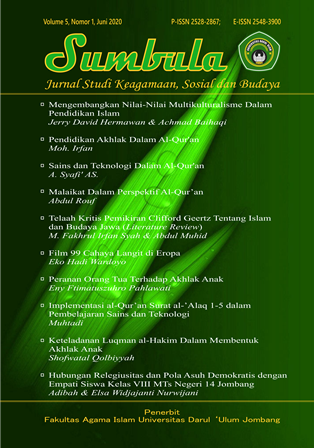Malaikat Dalam Perspektif Al-Qur’ân ‎(Kajian Komparatif ‎Penafsiran al-Ṭabarî dan Quraish Shihab)‎
Abstract
Abstract
This study aims to examine the angels in the perspective of the Qur'an (Comparative Study of the interpretation of al-Ṭabarî and Quraish Shihab).
This type of research is library research with a qualitative descriptive approach. The data collection method is a documentary, while the data analysis method uses inductive, deductive and comparative methods.
The results show that al-Ṭabarî is one of the commentators who offers a method of interpretation of bi al-Ma'ṡȗr with the narrative approach of the Companions, and tâbi'în, interpretation of angels tends to refer to Isriliyat. This can be seen from the interpretation which says that in essence angels and demons are a group of people in heaven. Devil used to be named ‘Azâzîl. While Quraish Shihab is one of the commentators who emphasizes bi al-ra'y interpretation patterns with the language analysis approach. According to the Quraish Shihab, that istiṡnâ’ 'in the word illâ Iblîs is istiṡnâ “which is munqaá¹i†so that the word "ill" means "but", so according to him, Devil is not part of the angel.
Keywords: Angels; Al-Qur'an; al-Ṭabarî; Quraish Shihab
References
al-‘Arabiyah, Majmu’ al-Lughah, Mu’jam Alfâẓ al-Qur’ân al-Karîm, ‎Mesir: Hay’ah al-Miṣriyah al-‘Ȃmmah li al-Ta’lîfi wa al-Nasyr 1970‎
al-‘Aridh, Ali Hasan, Sejarah dan Metodologi Tafsir, ter. Ahmad Akrom, ‎Jakarta: Rajawali Press, tt.‎
al-Afrîqî, Muḥammad bin Mukarram Lisân al-‘Arab, vol. 10, Beyrȗt: Dâr ‎Ṣadir, tt.‎
al-Muṣḥaf al-Ṣharîf, Tim Mujamma’ Fahd li Ṭibâ’a, al-Qur’ân dan ‎Terjemahnya, Madinah: Lembaga Percetakan al-Qur’an Raja Fahd, ‎‎1418 H.‎
al-Naysabȗrî, Muslim bin al-Ḥajjâj, Ṣaḥiḥ Muslim, vol.4, Beyrȗt: Dâr ‎Ihyâ’ al-Turâth al-‘Arabî, tt.‎
al-Râzî, Fakhr al-Dîn, Mafâtîḥ al-Ghayb, vol.16, Beyrȗt: al-Maktabah al-‎Syâmilah, tt.‎
al-Ṭabarî, Muḥammad bin Jarîr Abȗ Ja’far, Jâmi’ al-Bayân fî Ta’wîl al-‎Qur’ân, vol. 1,2,11,19,21,22,24, Beyrȗt: Mu’assasah al-Risâlah, tt.‎
Anwari, M. Hilal Tri, Jejak Malaikat Malaikat di Bumi, Jakarta: Pustaka ‎al-Kautsar, 2010‎
Barizi, Ahmad, Malaikat Di antara Kita, Jakarta: Mizan Pustaka, 2004‎
Efendi, Ahmad, “Konsep Zikir Menurut Dr. Quraish Shihab Dalam ‎Tafsir al-Misbahâ€, Skripsi S1, Jakarta: Fakultas Dakwah dan ‎Komunikasi, Universitas Islam Negeri Syarif Hidayatullah, 2008‎
Hidayat, Rahmat, “Pemikiran Muhammad Quraish Shihab tentang ‎poligamiâ€, Skripsi S1, Jakarta: Fakultas Syari’ah, Universitas Islam ‎Negeri Syarif Hidayatullah, 2008‎
Ismâ’îl bin ‘Umar al-Dimashqî, Abȗ al-Fidâ’, Tafsîr al-Qur’ân al-‘Adhîm, ‎vol. 7. Damaskus: Dâr al-Ṭaybah, tt.‎
Ma’rȗf, Baṣṣâr, dkk, Tafsîr al-Ṭabarî Min Kitâbihi Jâmi’ al-Bayân ‘An ‎Ta’wîl Ȃyi al-Qur’ân, vol. 1, Beirut: Mu’assasah al-Risâlah, 1994‎
Quá¹b, Sayyid, Fi Ẓilâl al-Qur’ân, Terj. As’ad Yasin dkk., vol 1, Jakarta: ‎Gema Insani, 2008‎
Rojali, Abdul Gofur, “Studi Sanad dan Matan Hadis Nabi Tentang Qorin ‎dari Golongan Jin dan Malaikatâ€, Skripsi S1 (Jakarta: Fakultas ‎Ushuluddin dan Filsafat, Universitas Islam Negeri Syarif ‎Hidayatullah, 2006), ‎
Shihab, M. Quraish, Jin, Iblis, Setan dan Malaikat : Yang Tersembunyi, ‎Jakarta: Lentera Hati, 2006‎
‎______, Membumikan al-Qur’an: Fungsi dan Peran Wahyu dalam ‎Kehidupan Masyarakat, Bandung: Mizan, 2003‎
‎______, Secercah Cahaya Ilahi Hidup Bersama al-Qur’an, Bandung: PT. ‎Mizan Pustaka, 2007‎
‎______, Tafsir al-Miṣbâh, Pesan, Kesan dan Keserasian al-Qur’ân, vol. ‎‎1, 4, 11, 13, Ciputat: Lentera Hati, 2000‎
‎______, Wawasan al-Qur’an Tafsir Maudhu’i Atas Pelbagai Persoalan ‎Umat, (Bandung: Mizan, 1996), 78‎
Syamsuddin, Zainal Abidin bin, Akidah Muslim, Bogor: Rumah penerbit ‎Almanar, 2010‎
Taymiyah, Ahmad bin Abd al-Ḥalîm bin, al-Fatâwâ al-Kubrâ vol. 5, ‎Beyrȗt: Dâr al-Ma’rifah, tt.‎
Tim Redaksi Kamus Bahasa Indonesia, Kamus Bahasa Indonesia, ‎Jakarta: Pusat Bahasa Departemen Pendidikan Nasional, 2008‎
Copyright (c) 2020 Abdul Rouf (Author)

This work is licensed under a Creative Commons Attribution-ShareAlike 4.0 International License.
- All material contained in this site is protected by law. It is prohibited to quote part or all of the contents of this website for commercial use without the approval of the board of editors of this journal.
- If you find one or more articles contained in Sumbula: Journal of Religious, Social and Cultural Studies that violate or potentially infringe your copyright, please report it to us, via email to Priciple Contact.
- The formal legal aspect of access to any information and articles contained in this journal site refers to the terms of the Creative Commons Attribution-ShareAlike (CC BY-SA) license.
- All Information contained in Sumbula: Journal of Religious, Social and Cultural Studies is academic. Sumbula: Journal of Religious, Social and Cultural Studies shall not be liable for any losses incurred by misuse of information from this site.






